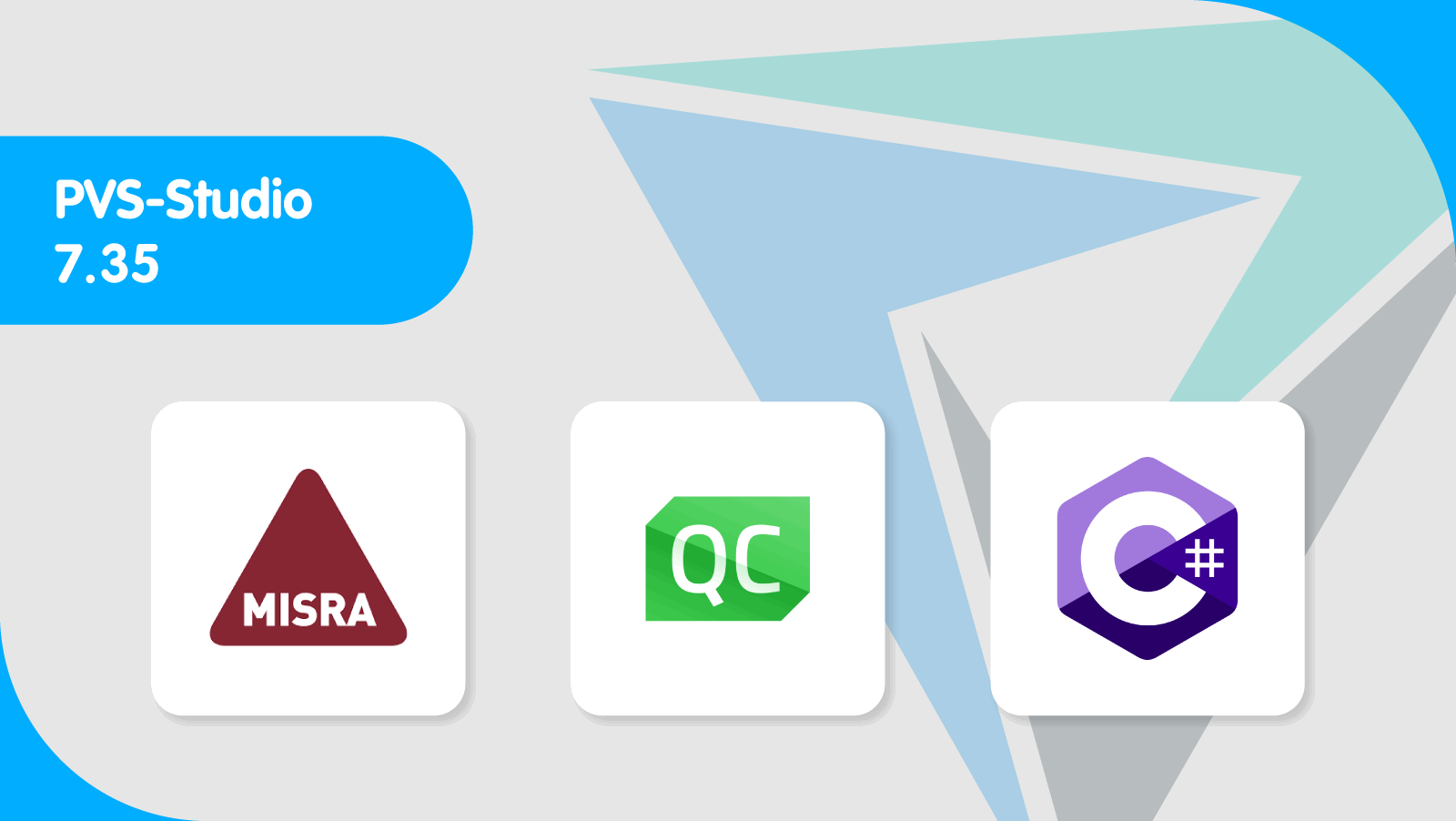Webinar: Let's make a programming language. Part 1. Intro - 20.02
PVS-Studio 7.35 has been released. Support for the MISRA C standard, the plugin for Qt Creator 15.x, modified file analysis in Visual Studio, and that's not all! See more details in this note.

You can download the latest PVS-Studio version here.
MISRA C standard coverage
We've begun work to expand the PVS-Studio's coverage of the MISRA C standard. With the release of 7.35, the first eight diagnostic rules have already been implemented, and more are on the way. The full list of implemented rules is provided below.
We plan to cover at least 85% of MISRA C and support the latest version of MISRA C 2023.
For more details on how PVS-Studio classifies warnings according to MISRA, please check out this page.
Qt Creator 15.x plugin support & Discontinuation of 9.x support
The PVS-Studio plugin is now available for Qt Creator 15.x.
Qt Creator 15.0.0 has an issue when installing plugins for a specific user via the installation wizard—the installation path differs from the expected search path. This issue has been resolved in version 15.0.1.
We've also discontinued the plugin support for Qt Creator 9.x versions. We aim to maintain backward compatibility by supporting the latest plugin versions for all Qt Creator versions within two years of each release.
Modified file analysis mode in Visual Studio plugin
The modified file analysis mode has been added to the plugin for Visual Studio. This mode can help you analyze only files modified relative to the saved state of the project directory.
It serves as an alternative to incremental analysis and is particularly useful for checking Pull Requests.
In release 7.35, we've also introduced an additional option for this mode: you can analyze both files modified since the previous analysis run and files that still contain warnings from the previous run.
For more details, please consult the documentation.
Note. We've recently posted an article: Grandma's recipe for mastering regular static analysis. It describes possible scenarios for using each of PVS-Studio analysis modes. Highly recommended reading!
C# analyzer optimization
The PVS-Studio team has optimized C# analyzer to handle code blocks with a large number of variable identifiers (500 or more). Previously, they could cause slowdowns during analysis.
If you're developing for Unity and looking to optimize your project, check out the article: PVS-Studio helps you optimize projects on Unity Engine.
Java and OWASP
Starting with the 7.34 release, the Java analyzer has focused on information security. By the 7.35 release, the tool covers 7 of the 10 OWASP Top Ten 2021 categories.
Currently, the analyzer can detect vulnerabilities in the following categories:
In future releases, we will continue to implement diagnostic rules to detect potential vulnerabilities from the OWASP Top Ten list.
You can learn more about how PVS-Studio covers OWASP Top Ten 2021 for C++, C#, and Java here.
Breaking Changes
These changes aren't backward compatible with earlier versions of the analyzer. You may need to adjust the way you use the analyzer due to these changes.
Changes: Java analyzer
‑‑license-path in the Java analyzer core and licensePath in PVS-Studio plugins for Maven and Gradle. Now, license information is saved to the path specified in the parameter instead of the default license location. For more details, please consult the documentation.‑‑convert flag with the toSuppress value.Changes: C and C++ analyzer
Change: MSBuild project analysis
Note. This change applies to analysis of C, C++, C# projects on Windows via PVS-Studio_Cmd and C# projects on Linux/macOS via pvs-studio-dotnet.
New diagnostic rules
C, C++:
C#:
Java:
Articles
For those, who code in C++:
With this release, the long and fascinating series of articles on undefined behavior has reached its conclusion! Here's a link to the article aggregator—a convenient way to navigate through different parts of the series:
C++ programmer's guide to undefined behavior
For those, who code in C#:
For those, who code in Java:
Other articles:
I'd like to highlight an article covering the changes over the past year: PVS-Studio in 2024. We highly recommend to read!
Video
How to use the PVS-Studio extension in Visual Studio Code
In this release, we've prepared a video tutorial demonstrating how to use our extension for Visual Studio Code, which includes:
Watch the tutorial here:
You can also read the text version of the tutorial in the documentation: Using PVS-Studio extension for Visual Studio Code.
"Terrible tips for a C++ developer" now available in PDF
Andrey Karpov's book "Terrible tips for a C++ developer" is now available in the PDF format! This humorous yet insightful collection dives into real situations from C++ programming practice that are better to avoid.
To get the book, simply subscribe to our article digest or Telegram bot—that's all! All the details are available at the link.
Would you like to check your project with PVS-Studio? Then start from this page.
Subscribe to the PVS-Studio newsletter to receive the latest release news.
0